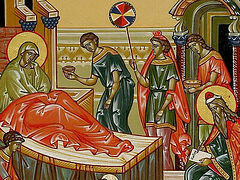 Photo: fotoload.ru O prophet and forerunner of the coming of Christ, we who honor thee with love are at a loss how to praise thee worthily.
Photo: fotoload.ru O prophet and forerunner of the coming of Christ, we who honor thee with love are at a loss how to praise thee worthily.
Well, how can we not be at a loss, how can we worthily praise the one about whom the Lord Jesus Christ Himself said, that there is no greater man born of women than John the Baptist?
How can we praise the one who is higher after the Theotokos than all the saints?
He is the first of the saints in the Kingdom of Heaven.
The merit of the saints is so great that we cannot count them. What then can be said of him who appeared to the world in the spirit and power of St. Elias?
You know what spirit Prophet Elias had; you know that this was a fiery spirit, burning with love for God. And the power of Prophet Elias is also indescribable, for by the power of his prayers he stopped the rain in the land of Canaan for three and a half years, and in his struggle with the pagan priests concerning the faith, he called fire down from heaven upon the sacrifice that had been doused with water.
This is the spirit and power with which John the Forerunner of the Lord came.
The holy prophet Isaiah said that he is the one whom we must call, a voice of one calling in the wilderness: prepare ye the way for the LORD; make straight in the desert a highway for our God (Is. 40:30).
And he fulfilled this task. But what was this task?
St. Macarius the Great said to the land of Egypt, inhabited by sinners, resembling a dense forest overgrown with brambles, with a thick overgrowth of reeds, that it is extremely hard to walk through such a thicket. One has to brush aside the branches with one’s hands, and part the overgrown reeds.
This is just what the country inhabited by the Jews was like before the coming of the Lord Jesus Christ.
It was an extraordinarily sinful country that had departed from faith in the True God into idolatry.
They were people who brought their children as sacrifices to Baal and Astarte, pouring out their blood.
And so, before St. John the Forerunner stood a challenge: to prepare the way of the Lord in this dense forest. Such a task had never been placed upon a man, and enormous spiritual strength was needed in order to fulfill it.
We recall that the holy Forerunner of the Lord prepared himself for this, having lived for over twenty years in the wild Judean desert. He lived alone and far from people, with wild animals. He wore a rough hair shirt and slept on the desert rocks.
Why was that necessary? So that in ceaseless prayer to God, in the most severe fasting, abstinence, and vigil, he would acquire the strength that was like the power and spirit of Elias. And the holy Forerunner of the Lord acquired that strength.
He shook the hearts of the Jews with his preaching on the banks of the Jordan. He prepared the way of the Lord with this preaching, with this fiery call to repentance.
His preaching was so powerful, so influential on human hearts, that people came in crowds from all over Judea to hear the Forerunner’s rebukes, to repent and be baptized with the baptism of repentance.
This baptism was needed in order to prepare for the true baptism in the name of the Father, and the Son, and the Holy Spirit, which our Lord Jesus Christ established.
The Forerunner was absolutely fearless. He never thought about his own safety; he so sternly stood for truth that he was not afraid to rebuke even King Herod for his unseemly adultery and iniquity. And for this, he endured execution.
Did not God Himself testify to the world of John's incomparable greatness, when he sent Archangel Gabriel to announce to priest Zacharias that this greatest of all men would be born to him?
Didn’t the archangel say that he would be filled with the Holy Spirit from his mother’s womb?
This is how I will praise St. John the Forerunner with my feeble lips.
I would also like to direct your attention to something else.
When Archangel Gabriel announced to the priest Zacharias that the Forerunner would be born to him, Zacharias did not believe it. He did not believe it, although he was filled with faith in God. Even though he and his wife Elizabeth were righteous, this righteous man nevertheless did not believe it.
Well, did God forgive him for his wavering faith? No, He punished him with a serious punishment—through the lips of Archangel Gabriel he commanded him to be mute for nine months, until the time would come for the prophecy to be fulfilled.
This was the righteous one’s punishment for his disbelief.
If the Lord so punished a righteous man for his wavering faith, then what will happen to us sinners if our faith is not firm?
We read in the epistle of the Apostle Paul to the Hebrews: But without faith it is impossible to please him: for he that cometh to God must believe that he is, and that he is a rewarder of them that diligently seek him (Heb. 11:6).
But how can you believe in Him Whom we can’t imagine; how can you love Him in Whom you don’t believe? But without faith and love, it is not possible to please God. Remember this.
From us is demanded unwavering faith, faith that is not shaken by anything.
If you waver in faith at any time, then do not remain in your wavering, but take care that you do not have to bear heavy punishment for this.
The priest Zacharias, whom God punished, was also forgiven by Him, and not only forgiven, but given the great gift of prophecy. For you heard what he said when his son John the Forerunner was born. He said:
Blessed be the Lord God of Israel; for he hath visited and redeemed his people, and hath raised up an horn of salvation for us in the house of his servant David; as he spake by the mouth of his holy prophets, which have been since the world began: That we should be saved from our enemies, and from the hand of all that hate us… (Lk. 1:68–71).
What is this? Isn’t this a prophecy concerning the Lord Jesus Christ? Isn’t it a prophecy about the Savior of the world, the Messiah?
Of course, yes, of course, it is an absolutely clear prophecy concerning the coming of the Savior.
Do you see, the Lord does not leave without punishment those who waver in their faith, but having punished Zacharias, the Lord forgave him; and He not only forgave him, but also gave the forgiven one the gift of His grace, the gift of prophecy.
Therefore, if it should happen that your faith is shaken, do not fall in spirit. Falls are unavoidable in our Christian life.
Remember how God forgave the priest Zacharias, the father of the Forerunner, and have hope that if you repent, He will also raise you up again to your Christian dignity and grant you the gifts of His grace, so that you might follow on after Him.
The Lord will help you.
Believe this, and know that the Lord will not abandon you even after your fall.
July 1, 1951



